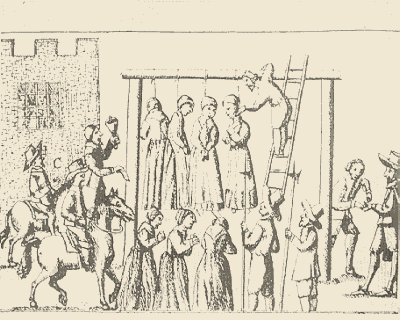At long last, the genetic basis for my distrust of organized religion has been revealed...

My great-aunt and my father were doing some genealogy on my mother's family the other day and came upon a surprising discovery: my great great great great great great great great great grandmother was a victim of the Salem Witch Trials.
Here’s my distant ancestor, Susanna Martin, according to an article in The American Genealogist by David Greene:
When Susanna Martin, an Amesbury, Massachusetts widow was arrested on May 2, 1692 for alleged witchcraft, the authorities took into custody a woman who had been suspected of that crime for some thirty years and one who may have used her reputation in order to get her own way with some of her credulous neighbors. Modern commentators have found her one of the more noteworthy victims of the Salem witchcraft hysteria, probably because at her preliminary hearing she defended herself with vigor and without respect for authority.
[...]
On April 30, 1692, six years after her husband's death, another warrant was issued for Susanna Martin's arrest for witchcraft, this time as part of the hysteria that had begun several months earlier at Salem Village through the accusations of several "afflicted girls" who claimed that they were being tormented by witches. Susanna was arrested on May 1, and a preliminary examination on the same day was noteworthy for the vigor of her answers and for the lack of respect she showed for the presiding magistrates. She laughed when the "afflicted girls" went into a fit and when asked why she did so, she responded, "Well I may at such folly." When she was asked what ailed the girls, Susanna said: " I do not desire to spend my judgm't upon it." She stated bluntly that she did not think the girls were bewitched. Her answer to the request that she provide her thoughts about them was impertinent: "Why my thoughts are my own, when they are in, but when they are out, they are anothers." Other replies show that she was aware of the seriousness of her situation and that she denied guilt fervently. But she kept her sharp tongue even at the end of the examination: "Do you not see how God evidently discovers you?" "No, not a bit for that." "All the congregation think so." "Let them think w't they will."
The jurors thought what they would and indicted her. Susanna's lack of respect for authority was not, of course, the main reason that she was indicted, though it can hardly have prejudiced the magistrates in her favor. The Rev. John Hale, minister of the Beverly Church, who had supported the trials but had second thoughts after his wife was accused, states, rather clumsily, that Susanna was one of those who "had been suspected by their Neighbours several years, because after quarrelling with their Neighbours, evils had befallen those Neighbours".
In several instances, depositions indicate that Susanna was given to muttering enigmatic phrases that could be--and were, at least by hindsight--interpreted as threats. The evidence that any accused witch uttered such threats is weakened by the tendency of the superstitious to create something ominous out of nothing, but the cumulative effect of testimony against many accused witches throughout several centuries suggests that some consciously fostered suspicions about themselves in order to get their way in village dealings or simply to increase their own sense of importance.
[...]
Susanna Martin underwent the indignity of a physical examination on June 2, 1692. Such examinations were intended to discover whether the accused had any physical abnormalities, especially anything that could be used to suckle a familiar or even the devil himself. Susanna was examined twice during the same day; at neither examination was any abnormality discovered, but at the first her breasts appeared to be full and at the second slack. Doubtless the magistrates found this apparent indication that she had actually suckled even more satisfactory than an abnormal "witch's teat."
At her trial held at Salem on 29 or 30 June 1692, Susanna pleaded not guilty but was convicted and hanged at Gallows Hill on July 19, with four others tried at the same time: Sarah Good, Elizabeth How, Sarah Wildes, and the famous Rebecca Nurse. Cotton Mather choose her case as one of the five that he detailed in his "Wonders of the Invisible World" (1693), a defense of the proceedings that, as modern scholars have shown, he would rather not have made. Mather clearly considered these five the most obviously guilty, and he commented that Susanna "was one of the most Impudent, Scurrilous, wicked creatures in the world; and she did now throughout her whole Trial discover herself to be such an one. Yet when she was asked, what she had to say for her self? her Cheef Plea was, That she had Led a most virtuous and Holy Life!" I suspect that her scorn of authority led Mather to this outburst, for Cotton Mather--the son of the Rev. Increase Mather and the grandson of two other prominent Puritan divines, Richard Mather and John Cotton--never, in his own estimation, received fully from the third generation of Puritans the respect that he thought his position and ancestry merited.
That's my great great great great great great great great great nana Susanna for you, "one of the most Impudent, Scurrilous, wicked creatures in the world". I very much hope this is all true and we are actually related. The family tree my dad sent me seems convincing, and my mom's side of the family does indeed have deep, deep New England roots, so I'm pretty convinced. Neverthelesss, Susanna sure sounds like a cool lady and it would be a great honor to share a little DNA with someone so aggravating to the Puritan powers-that-were.

